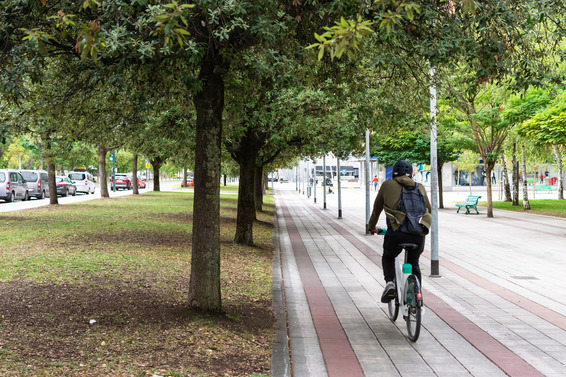
By SDCN Editor
Sacramento, CA–The California Air Resources Board (CARB) recently awarded $33 million in grants to support projects that increase access to zero-emissions transportation and diversify mobility options for schools and communities that service more than 20 low-income areas, including a new effort that empowers communities with resources to plan for future transportation projects.
The programs, called Clean Mobility in Schools (CMIS) Sustainable Transportation Equity Project (STEP), and Planning and Capacity Building, awarded funds to 12 projects across California that will support innovative projects such as electric car-sharing, bike and pedestrian infrastructure, traffic calming, and educational and outreach efforts, among others. The planning and capacity-building work will help resident-led initiatives fund needs assessments and plan development efforts so that communities have the tools to pursue further funding opportunities.
The goal of the funding is to increase options for clean transportation in underserved communities while reducing greenhouse emissions and vehicle miles traveled to make it easier for residents to get to key destinations such as schools, medical facilities, grocery stores, and jobs without the need for personal vehicles.
“Planning for a zero-emission future means helping Californians access essential everyday needs with clean and shared transportation options while reducing reliance on personal vehicles. Through these clean mobility grants, we are helping communities bring their transportation ideas to fruition and addressing historic inequities in places that have been underserved by mobility options,” said CARB Chair Liane Randolph.
Award recipients’ locations in California include:
City of San Diego: The City Heights Community Development Corporation received $3,300,000 to develop bike and pedestrian infrastructure that will connect an affordable housing complex to a nearby transit center, in addition to outreach and engagement.
City of Needles: Located in San Bernardino County, the city received $370,729 to organize bike and pedestrian outreach and engagement events at local elementary schools and other community spaces, which will include equipment testing to provide feedback for a future e-bike sharing program. The funds will also help residents provide feedback on 50 miles of current sidewalks and road conditions for potential bike and other infrastructure improvements.
San Joaquin Valley: Several cities that participate in the San Joaquin Valley Community Shared Mobility effort were granted $500,000 to conduct a transportation needs assessment for future planning efforts.
City of El Monte: The city received $6,549,855 to purchase four electric buses, and a charging station and provide training for bus drivers for expanded shuttle services. The funds will also help provide 250 residents with $800 e-bike vouchers, 20 EV carshare vehicles and needed infrastructure across six sites.
City of Watsonville: The Ecology Action project received $7,218,058 to launch an electric car share and expand its existing bikeshare program with 50 new docking stations. The funds will also support the installation of safety infrastructure that includes 98 refreshed or new visibility crosswalks, 89 curb extensions, 76 new or upgraded curb ramps, two pedestrian refuge islands, 10 school crossing signs, and other repairs for its Safe Routes to School projects.
City of Hayward: The Safe Routes and Active Transportation for Schools and Underserved Communities project has been awarded $6,206,508 to provide vouchers that will fund bike purchases, along with free locks and helmets. The program will also support outreach and education events such as bike parades, fix-it workshops, and safety courses.
City of Sacramento: The Sacramento City Unified School District was granted $500,000 to conduct a needs assessment for its Safe Routes to School for All program that will recruit up to eight students from local elementary, middle, and high schools to participate. The team will conduct walking audits at 15 schools to assess transportation and safety barriers and organize outreach and education events.
The funding is part of the $48 billion California Climate Commitment, which includes over $10 billion to accelerate the ZEV transition and build charging infrastructure. Funding also comes from California Climate Investments, a statewide initiative that puts billions of Cap-and-Trade dollars to work reducing greenhouse gas emissions, strengthening the economy, and improving public health and the environment – particularly in disadvantaged communities.
CARB selected Data for Social Good, in partnership with Momentum and the Institute for Sustainable Communities, to serve as the administrator for the planning projects and provide capacity-building and technical assistance to all awardees.
